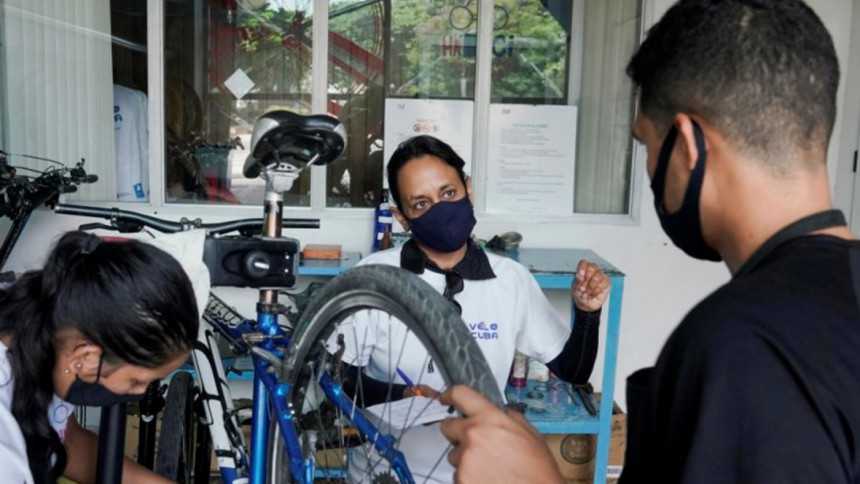Cuban entrepreneurs get ready for a more open economy

Image: Collected
Cuban entrepreneurs, running businesses ranging from selling dried fruit to repairing bikes and developing software, are scrambling to understand the opportunities and challenges ahead after a landmark change in the rules governing the Communist-run economy.
Earlier this month, the government released regulations about a reform that would allow small- and medium-sized ventures to formally incorporate as businesses and access state financing, ending decades of classifying them as 'self-employed'.
The measure is seen by many analysts as one of the most important reforms undertaken since all businesses - down to shoe-shine boys - were nationalized in 1968 by former leader Fidel Castro.
Omar Everleny, one of Cuba's best-known economists, described the reform as a very positive one, long-sought by many Cubans.
It does have important limits - for instance, people can own no more than one business and cannot contract foreign partners or carry out direct foreign trade.
"Given the economic situation and remaining restrictions, it will not mean a big economic improvement in the short term," cautioned Everleny.
For Nayvis Diaz, founder of Velo Cuba, a bicycle repair and rental company with 17 employees in Havana, it marks a significant change, however.
"What is important is we are now fully part of the economy and no longer marginalized," she said. "Many people with a lot of social and business responsibilities in the city, and many others in the private sector, were waiting for this."
The measure forms part of a package of market-oriented reforms undertaken by Cuban President Miguel Diaz-Canel over the last year, as the coronavirus pandemic and tougher US sanctions tipped the shaky economy into a tailspin and led to shortages of food, medicine and other basic goods.
Cuba's economy contracted by 10.9 per cent in 2020 and shrank another 2 per cent this year through June, compared with the same period in 2020.
It remains reliant on tourism and imports.
The Fernandez brothers, who own Deshidratados Habana, Cuba's only company processing and selling dried fruits, were nevertheless enthusiastic.
"A bad economy can present opportunity," Oscar Fernandez said, standing amid makeshift ovens and other equipment in his basement. The company began when the pandemic forced their cafeteria to close, he explained.
Hundreds of small businesses have found niches in a state-dominated economy short on imagination and initiative: from gourmet restaurants and 3D-parts manufacture to software development, home delivery, landscaping and construction contracting.
Earlier this month, the government released regulations about a reform that would allow small- and medium-sized ventures to formally incorporate as businesses and access state financing, ending decades of classifying them as 'self-employed'.
The measure is seen by many analysts as one of the most important reforms undertaken since all businesses - down to shoe-shine boys - were nationalized in 1968 by former leader Fidel Castro.
Omar Everleny, one of Cuba's best-known economists, described the reform as a very positive one, long-sought by many Cubans.
It does have important limits - for instance, people can own no more than one business and cannot contract foreign partners or carry out direct foreign trade.
"Given the economic situation and remaining restrictions, it will not mean a big economic improvement in the short term," cautioned Everleny.
For Nayvis Diaz, founder of Velo Cuba, a bicycle repair and rental company with 17 employees in Havana, it marks a significant change, however.
"What is important is we are now fully part of the economy and no longer marginalized," she said. "Many people with a lot of social and business responsibilities in the city, and many others in the private sector, were waiting for this."
The measure forms part of a package of market-oriented reforms undertaken by Cuban President Miguel Diaz-Canel over the last year, as the coronavirus pandemic and tougher US sanctions tipped the shaky economy into a tailspin and led to shortages of food, medicine and other basic goods.
Cuba's economy contracted by 10.9 per cent in 2020 and shrank another 2 per cent this year through June, compared with the same period in 2020.
It remains reliant on tourism and imports.
The Fernandez brothers, who own Deshidratados Habana, Cuba's only company processing and selling dried fruits, were nevertheless enthusiastic.
"A bad economy can present opportunity," Oscar Fernandez said, standing amid makeshift ovens and other equipment in his basement. The company began when the pandemic forced their cafeteria to close, he explained.
Hundreds of small businesses have found niches in a state-dominated economy short on imagination and initiative: from gourmet restaurants and 3D-parts manufacture to software development, home delivery, landscaping and construction contracting.
Source: https://www.thedailystar.net
Tags :
Previous Story
- Latest iOS 15 and watchOS 8 Beta Lets...
- Massive New iPad Pro Could Finally Replace the...
- Semiconductor Shortage Effect Extends Beyond Automotive
- 90pc business software in Bangladesh is pirated: US...
- App Recap: Heart Reports, HibiDo, and Weather on...
- Volkswagen found in talks with rivals on building...
- Digitalisation synonymous with local ICT’s success
- Buoyant economy sending positive signals to global investors